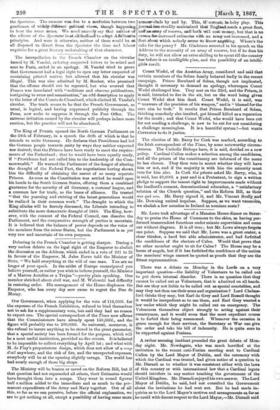The King of Prussia opened the North German Parliament on
the 24th of February, in a speech the drift of which is that he intends to unite Germany. He declares that Providence had led the German people towards pnity by ways they neither expected nor desired; that the Princes have been ready to meet the require- ments of the Fatherland ; that he would have been equally ready, if "Providence had not called him to the leadership of the Com- monwealth." He warned the Parliament of the danger of altering the draught of the Federal Pact, the negotiations having shown him the difficulty of obtaining the assent of so many separate Princes. As soon as the Constitution was settled he would open his hands to the South German States, offering them a combined guarantee for the security of all Germany, a customs' league, and a common law for trade, as the bases of affiance. He trusted " that the yearning and striving of the latest generations would be realized in their common work." The draught to which the King alludes will be fiercely discussed, the Liberals intending to substitute the more democratic draught of 1848. The King, how- ever, with the consent of the Federal Council, can dissolve the Parliament, and the comparative strength of parties is uncertain. It is believed that the balance of power depends on the votes of the members from the minor States, but the Parliament is as yet very raw and uncertain of its own purposes.






























 Previous page
Previous page